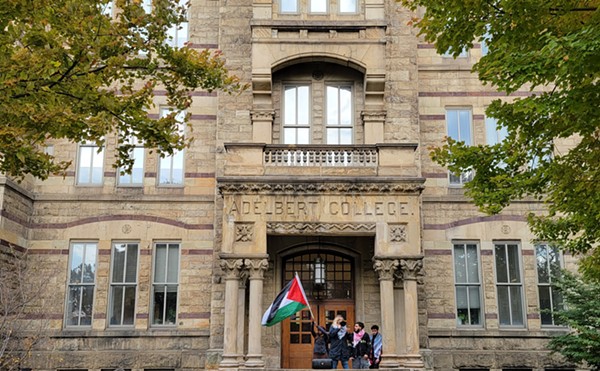Since opening Chronic Tattoo in Elyria in 1994, he's tattooed thousands of people with designs large and small. Three-quarters of his customers, he estimates, are from the Cleveland area, even though he's a half-hour drive from the city.
"I'm constantly asked, Why are you so far out, away from Cleveland?" he says.
The answer is that tattooing has been illegal in Cleveland for 80 years. Other Cuyahoga County communities also ban tattooing or severely restrict it, pushing almost all area tattoo studios into neighboring counties.
That may change soon. DeRigo has teamed up with the American Civil Liberties Union to challenge Cleveland's tattoo ban. In late July, ACLU attorneys say, they sent a letter to the city, arguing that the ban is unconstitutional and asking it to reconsider the law. If they don't hear back by August 7, DeRigo and the ACLU say, they plan to file a lawsuit in federal court.
"Hopefully, [the city] can be adult and modern enough to understand that [tattooing is] very safe," says DeRigo.
The city law department had not yet seen the ACLU letter and could not comment, mayoral spokesman Brian Rothenberg said late last week.
DeRigo's attorneys say Cleveland's ban violates tattooists' First Amendment right to artistic and commercial free speech.
"We're talking about an art form that's as old as human society," says Ray Vasvari, legal director of the ACLU of Ohio. "Even today, in preliterate and aboriginal societies, people tattoo and are tattooed for religious, symbolic, and artistic reasons. The city is trying to interfere with one of the oldest forms of human expression."
The ban has driven artists to other cities, says DeRigo. "There's been a lot of good tattooists that have come out of Cleveland. But that's the thing: They come out of Cleveland."
The ban on tattooing dates back to 1920, when it was written into the city's first sanitary code, as the city joined the era's nationwide fight against communicable diseases.
City council last affirmed the ban in 1992, when it added an exception for exhibitions and conventions that last four days or less. Last week, for instance, Nautica hosted the Tattoo the Earth festival, which featured nationally known tattoo artists inking concertgoers during performances by heavy metal bands.
DeRigo's attorneys will use the four-day exception -- and the fact that the city allows body-piercing studios -- to argue that the city's tattooing ban is unreasonable.
"The city's not allowing people to go to a permanent studio to have art applied to their bodies. But you can go to a convention center and see some guy who's not going to be there in two days and get a tattoo from there," says Dan Margolis, who represents DeRigo. "That, practically speaking, would be more difficult to regulate than a permanent tattoo studio. There's not the same need to maintain a reputation in the community."
Tattooing was unregulated in Ohio until 1997, when the state legislature passed a law that established health standards and mandated inspections of tattoo and piercing parlors. But cities are still free to enforce tougher restrictions than the state law.
Euclid also bans tattooing. Laws in other Cleveland suburbs effectively prevent tattoo parlors from opening: Lakewood requires a doctor to be present during all tattooing; Parma requires a nurse practitioner's presence.
Tattoo parlors catering to Cleveland-area residents sit right across the county line in Lake, Lorain, and Summit counties. Tony Leanza, co-owner of Finest Lines, a tattoo parlor in Wickliffe, says almost all of his customers come from Cuyahoga County. If Cleveland's ban were lifted, "I'd open up next to the Rock Hall, in the Flats, and in Little Italy," he says.
City Council President Mike Polensek isn't sure whether council would lift the ban. "I don't think I've gotten a call or a letter from anyone [saying] they miss tattoo shops or need to have tattoo shops in their neighborhood," he says.














